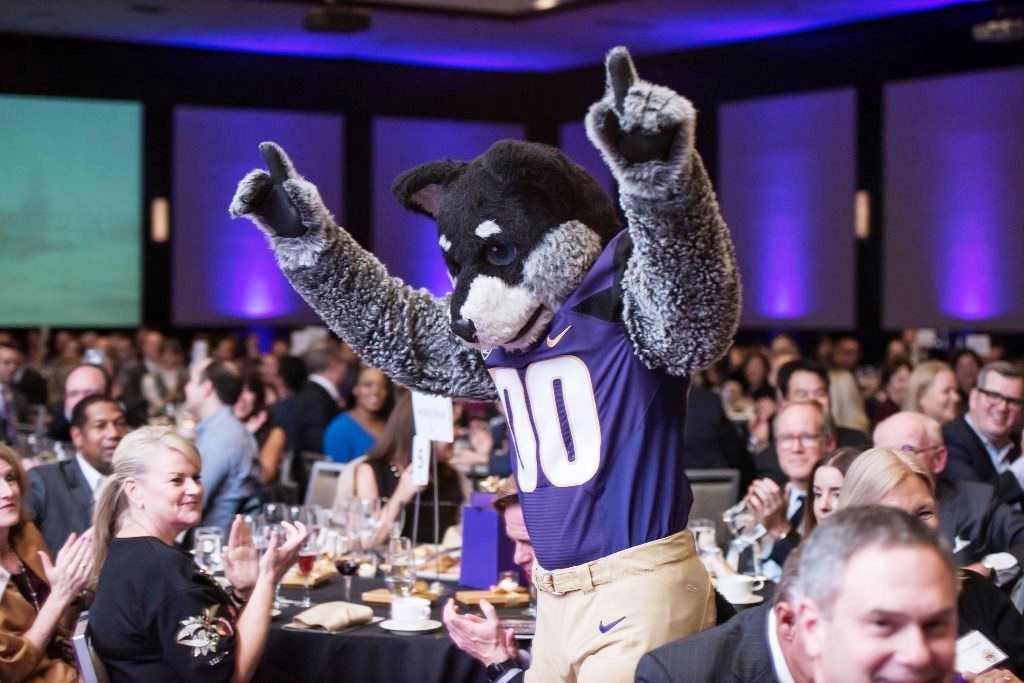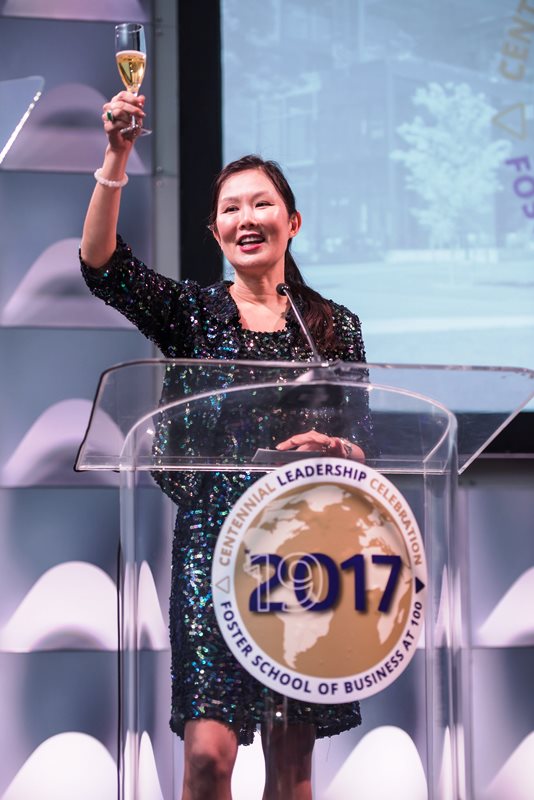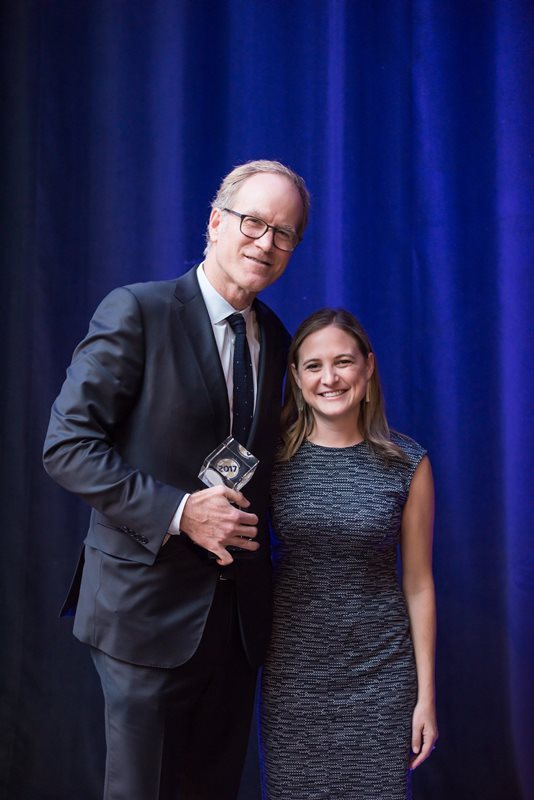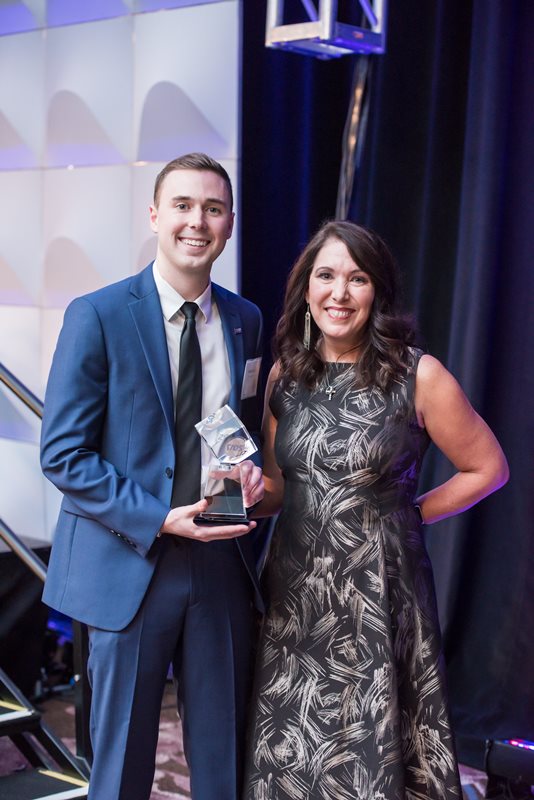Foster celebrates a century of business leadership in the Northwest
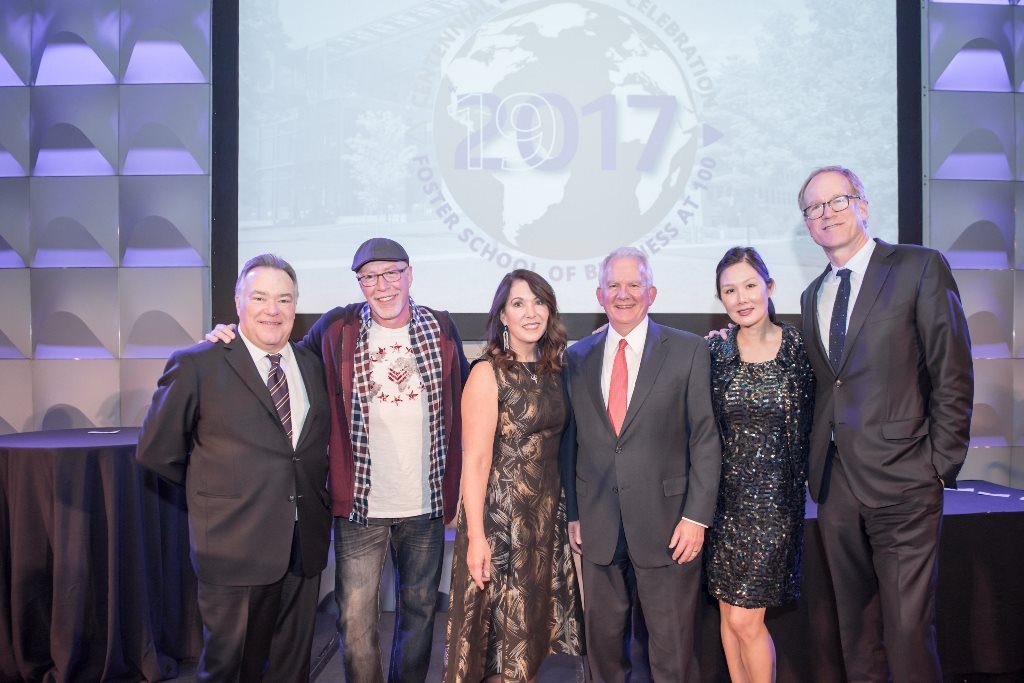
Foster Dean Jim Jiambalvo, Microsoft’s James Whittaker, Boeing’s Beverly Wyse, PACCAR’s Ron Armstrong, Godiva’s Annie Young-Scrivner, and Nordstrom’s Pete Nordstrom.
On a night to revel in past glories and imagine a fascinating future, the University of Washington Foster School of Business welcomed more than 600 alumni, students, faculty and friends to its Centennial Leadership Celebration, November 2 at the Seattle Westin.
This 26th edition of the school’s annual gala—honoring the transcendent leaders who create and foster prosperity in the Northwest—took a detour from tradition.
Dean Jim Jiambalvo led an historic tour of the Foster School’s rich history. Instead of adding to the ranks of 70 Distinguished Leadership Awardees, the school recognized three iconic Northwest firms—Boeing, PACCAR and Nordstrom—as “Companies of the Century.” And Microsoft’s technical evangelist, James Whittaker, blew minds with his foray into the brave new world that lies beyond “the cloud.” Even Harry Husky was in the house.
Of the century
“One hundred years as the leader in business education in the Northwest is an amazing achievement,” toasted the evening’s emcee, Annie Young-Scrivner (BA 1991), CEO of Godiva and vice chair of the Foster School Advisory Board. “Here’s to a century of success and a century of opportunities to come.”
Dean Jiambalvo revisited that century of success, beginning with the launch of a scrappy startup b-school back in autumn of 1917 with seven professors and a dozen students. “A pretty good student-faculty ratio,” he quipped.
The school grew exponentially, quickly becoming the largest at the UW and one of the finest in the nation. Jiambalvo breezed through decades of degree program expansion, construction of new facilities, the pantheon of trailblazing leadership, and the introduction of student-focused centers of entrepreneurship, consulting and global business.
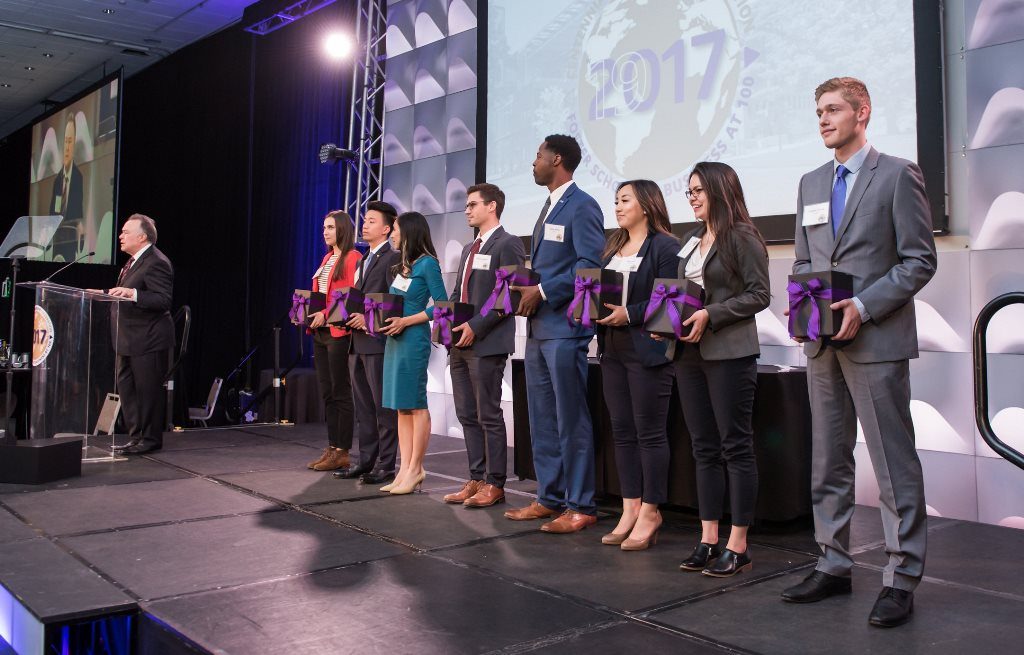 “As we look back, we see a great history,” he said. “But together, we create futures. The Foster School is committed to educating and guiding talented minds to be the business leaders of today and tomorrow—for Washington, for the world.”
“As we look back, we see a great history,” he said. “But together, we create futures. The Foster School is committed to educating and guiding talented minds to be the business leaders of today and tomorrow—for Washington, for the world.”
The Nordstrom way
Young-Scrivner pointed out that the three foundational Northwest firms being honored as Companies of the Century have also been creating futures and making a significant impact on the Northwest economy for more than a century—in fact, a collective 329 years.
Nordstrom was introduced by Gillian Van Der Schaaf (MBA 2018), a second year MBA, president of Foster’s MBA Association, Fritzky Fellow and loyal Nordstrom customer who experienced the legendary retailer’s unique culture firsthand as summer associate. “I’ve never encountered a more thoughtful and respectful organization,” she said. “It was truly exciting to learn that a company that I’ve admired for years from the outside is just as genuine on the inside.”
Nordstrom, of course, is a leading fashion specialty retailer that operates 365 stores across North America with more than $14 billion in annual sales. Co-founded as a shoe store in 1901 by John W. Nordstrom, this unique family company has been steadily grown by four generations of the Nordstrom family, all the while acting as dedicated stewards of the founding principles of providing gold standard quality and customer service—not to mention exemplary philanthropy and civic leadership.
Co-president Pete Nordstrom accepted the award, with characteristic Nordstrom humility, on behalf of everyone else.
“I often hear about how great it is that my family is still leading the business, and I guess that’s true in a certain respect,” he said. “But the success of our company is really not about individuals named Nordstrom. There’s not that many of us, and not many customers even know who we are. Our business is really defined by the 70,000 people who show up to work every day and treat the business as if it’s their own and their name hangs over the door. Any reputation we’ve gained over the years for great service or having a great business results is really a tribute to them.”
PACCAR for the long haul
PACCAR Inc was introduced by Jessica Enzi (MBA 2018), a third-year Evening MBA at Foster who has worked at PACCAR since earning her BA from the UW in 2007, following in the footsteps of her mother, who joined the company before Jessica was born.
“PACCAR cares deeply about its employees,” said Enzi, a recipient of the Paul Pigott Scholarship. “The tangible encouragement to continue education at the UW and elsewhere comes in the form of robust tuition support which made the possibility of pursuing an MBA a reality for me. The same program helped my mother pursue her own academic goals.”
PACCAR, founded in 1906 by William Pigott, Sr., is a global technology leader in the design, manufacture and customer support of premium trucks under the Kenworth, Peterbilt and DAF nameplates, as well as advanced diesel engines, financial services, information technology and related parts. With 23,000 dedicated employees, PACCAR earns annual revenues in excess of $17 billion from sales in more than 100 countries. The Foster School has been a frequent beneficiary of PACCAR’s generous philanthropy, including major investment in PACCAR Hall, student and faculty support and the PACCAR Award for Excellence in Teaching.
Accepting the award was Ron Armstrong, the CEO of PACCAR and proud father of two Foster grads.
“The long-term relationships we have with our suppliers, our customers, our dealers, our employees, have been a key part of PACCAR’s success for 112 years,” he said. “Equally important is the relationships with the communities in which we work and live. PACCAR, the PACCAR Foundation, the Pigott family and thousands of employees have called Seattle home for more than a century. And we’ve had a special relationship with the University of Washington.”
Boeing’s new frontiers
Chad Shapard (BA 2017), a newly minted strategy analyst at Boeing introduced his employer by way of his own tale of family tradition. His grandfather ran away from home at 16 and worked his way through school at Boeing—the start of a rewarding 38-year career. And after a series of internships during his own college years, Chad was thrilled to join in the “family business.”
“For me,” he said, “Boeing means opportunity.”
The Boeing Company, founded on the shores of Seattle’s Lake Union in 1916 by William Boeing, has grown into the world’s largest aerospace company and the leading manufacturer of commercial jetliners, defense, space and security systems. America’s largest exporter employs nearly 150,000 people and earns annual revenues of nearly $95 billion.
Accepting the award was Beverly Wyse (MBA 2005), president of shared services at Boeing who completed both Foster’s Aerospace Industry Management Seminar (AIMS) and Executive MBA Program. Inspired by the evening’s time traveling theme, Wyse reflected on the one paramount characteristic that links past and future success for Boeing, as well as the region’s other enduring firms.
“The world is changing. Our companies are changing,” she said. “And perhaps the most critical characteristic of the companies that are being honored here tonight—and the many others that have survived and thrived—is that ability to evolve. Can we see what’s coming next? Are we willing to embrace the change that’s before us? It’s a big part of what’s made Boeing, Nordstrom, PACCAR and the University of Washington successful. And I think we all need to embrace it if we want to last the next 100 years.”
Fast forward
What’s coming next? Microsoft’s Whittaker addressed this very question in his forecast of our not-so-distant future.
Whittaker tracked three technology revolutions that have dramatically changed our lives in the past 30 years. First the PC put computing in the hands of everyone. Then the web allowed us to share everything we were doing on our PCs (and tablets and phones). Then the cloud took all of those web servers scattered all over the world and aggregated them into a single data center, essentially.
“Data is the new oil,” Whittaker said. “But, like oil, it’s not really valuable until you can extract energy from it. Data isn’t valuable until you can extract knowledge from it.”
Right now, we humans are drowning in data.
Enter tech revolution number four: a “planetary data substrate” composed of everything in life, reduced to data. Whittaker said it’s evolving before our eyes, powering machine learning, artificial intelligence, the coming “Internet of Things.”
All of this is creating opportunity, but also a profound existential conundrum. “What’s left for humans? What doesn’t reduce to data?” Whittaker asked. “That’s the question we need to be asking and answering.”
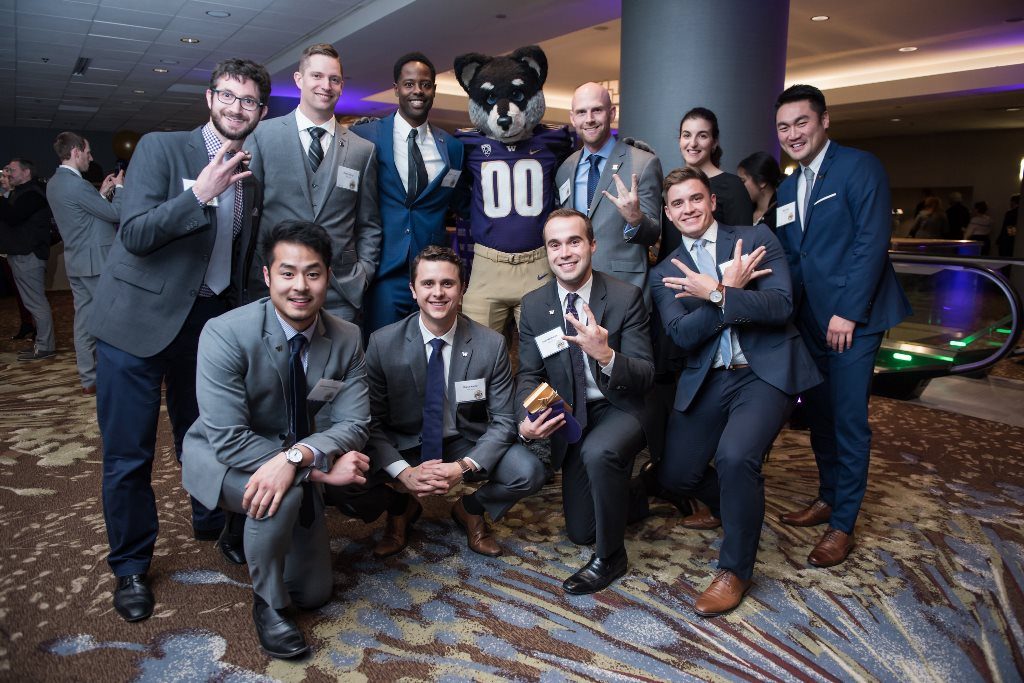 He suggested two distinctly human virtues to develop in the coming age: coding and creativity: “Nurture your ideas, nurture that creative soul of yours. Because it’s the one place that machines don’t seem willing to go.”
He suggested two distinctly human virtues to develop in the coming age: coding and creativity: “Nurture your ideas, nurture that creative soul of yours. Because it’s the one place that machines don’t seem willing to go.”
Business community
The evening wrapped up with a Centennial Showcase, an opportunity to learn firsthand what the Foster School’s evolution looks like today.
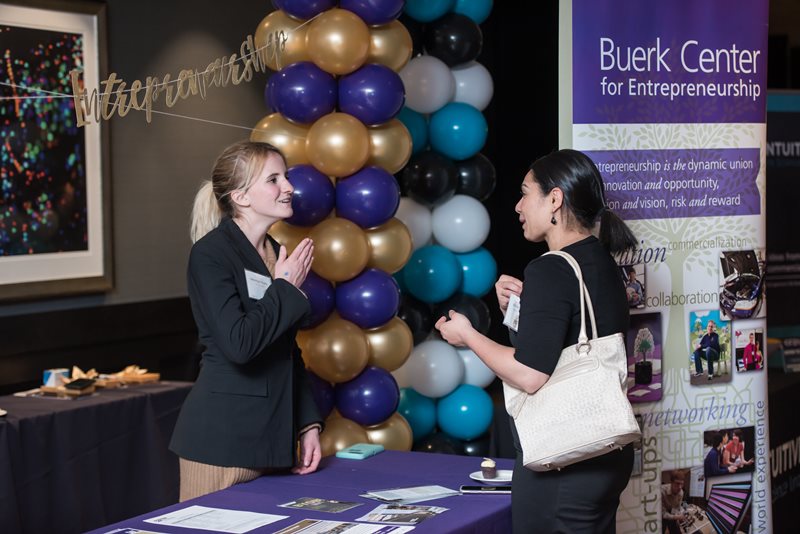 That evolution of Foster has been powered by many invaluable corporate and individual partnerships, many of which were on display at the Westin.
That evolution of Foster has been powered by many invaluable corporate and individual partnerships, many of which were on display at the Westin.
The Centennial Reception was sponsored by Deloitte. The Awardee Sponsor was GM Nameplate. A commemorative Centennial Book—filled with some of the school’s most illustrious alumni, faculty and advisors—was underwritten by Alaska Airlines.
The Centennial Showcase sponsored by Intuitive IP, with a prize-winning Wheel of Foster sponsored by SuperGraphics.
Gold Sponsors included Accenture, Susan Bevan & Tony Daddino, The Boeing Company, Jason & Stephanie Child, Kathy & John Connors, Neal & Jan Dempsey, Bill & Sally Douglas, EY, The Foster Foundation, Fran’s Chocolates, the Fritzky Family, Dan Fulton, Godiva, Charlie & Nancy Hogan, Holland America Line, the Hughes Family, Joe Chocolates, Kemper Development Company, KPMG, Liberty Mutual, Nordstrom, Eileen O’Neill Odum, PitchBook, Premera Blue Cross, Providence St. Joseph Health, PwC, Shelley Reynolds, Bruce & Gail Richards, Safeco, Saltchuk, Wells Fargo, Windermere Real Estate, Gary & Barbara Wipfler, Workday, Annie Young-Scrivner, Yoyostring Creative, and Zevenbergen Capital Investments LLC.
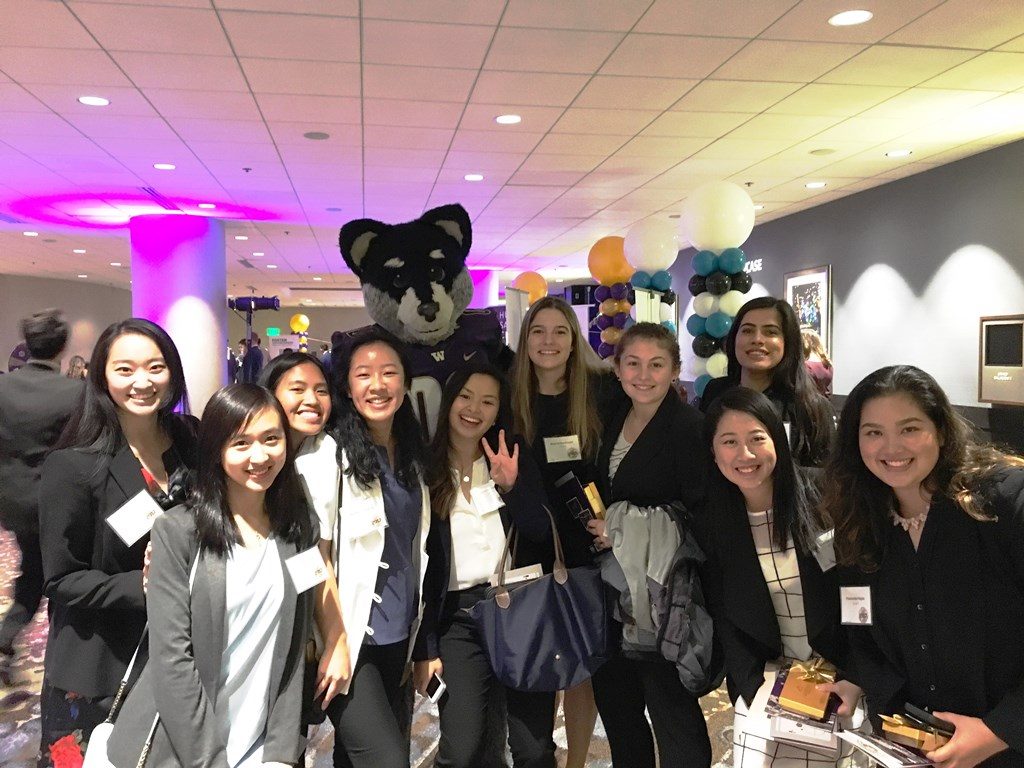 Student & Young Alumni Tables were sponsored by Dorrit Bern, Costco Wholesale and Ken & Mary Denman.
Student & Young Alumni Tables were sponsored by Dorrit Bern, Costco Wholesale and Ken & Mary Denman.
Net proceeds from the Centennial Leadership Celebration will help create futures at the University of Washington.

